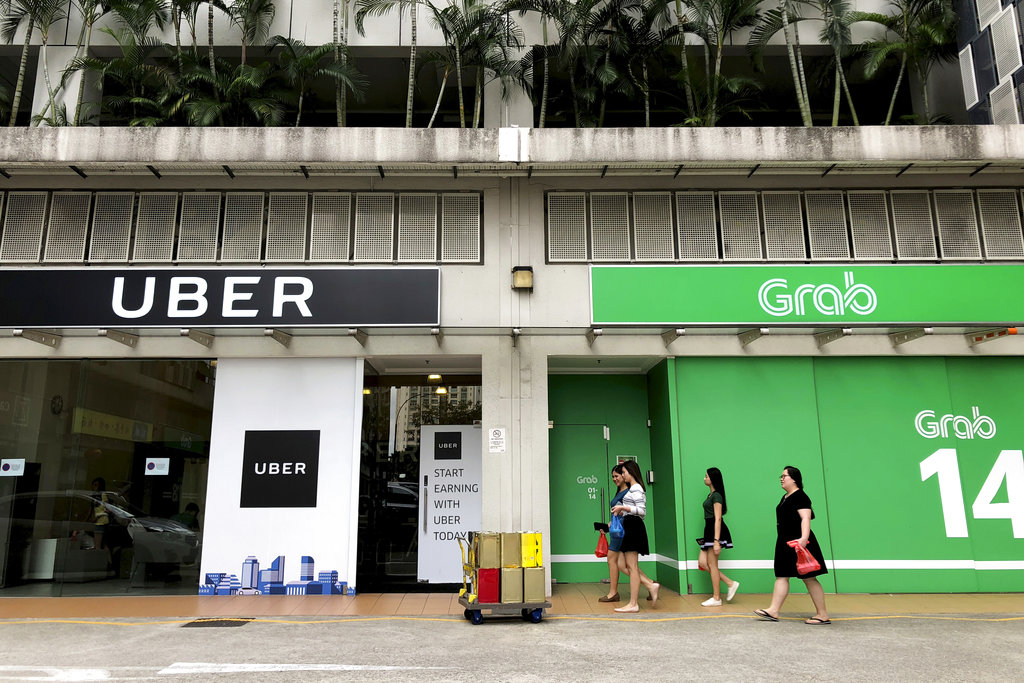
Office workers walk past Grab and Uber offices during their lunch hour Monday, March 26, 2018, in Singapore. Grab, a fast growing Southeast Asian ridesharing, food delivery and financial services business, said Monday that Uber will take a 27.5 percent stake in it and a seat on its board as part of the deal. (Photo WONG MAY-E / ap)
Two government regulatory bodies are now at loggerheads with each other as the Land Transportation Franchising and Regulatory Board (LTFRB) ordered Uber to resolve its issues with the Philippine Competition Commission (PCC) by Sunday, April 15, after which it would cease to be recognized as a transport network company (TNC).
“In the interest of all TNVS [transport network vehicle services] and the riding public, we are giving you until April 15 to exist as a TNC. On April 16, you will cease and desist to exist as a TNC,” LTFRB board member Aileen Lizada said during Wednesday’s special board meeting.
The LTFRB order comes just four days after the PCC told Uber and Grab to continue to operate independently in the country while it conducts its motu propio review on the deal, which resulted in Uber’s exit from Southeast Asia and gave it a 27.5-percent stake in Grab’s operations in the region.
During the hearing, Uber Philippines’ counsel Joseph Omar Castillo told the board that while they intended to withdraw their petitions for a fare hike and reaccreditation as a TNC, they were constrained to do so because of the PCC order.
Earlier, Grab Philippines country head Brian Cu said that, under their transaction service agreement with Uber, they decided to extend their funding of the operations of the Uber app to April 15 just to comply with the PCC directive.
According to him, however, doing so would not only defeat the purpose of what PCC wanted, but would also put the riding public in danger since Uber would no longer have any back-end support in the country that would address complaints and take care of passengers in the event of an accident.
In issuing the order, Lizada said that, the LTFRB understood Uber’s predicament, prolonging its operations would adversely affect the riding public and the thousands of app-based drivers.
The PCC review is expected to last for around six months.
“The soonest possible time that you [Uber] will be able to resolve your concerns with PCC, the better,” she said.
Meanwhile, LTFRB also ordered Grab to “immediately” lower its surge pricing cap from twice the rate to just 1.5, as it processes the accreditation of new TNCs that would take the place of Uber.
“This is to ensure that the fare will be at a rate that is conducive and acceptable to the existing number of TNVS that are transferring to Grab,” Lizada said.
In recent days, passengers have complained of Grab’s high fares following Uber’s exit in the country.
But Cu said they were not taking advantage of the situation as he pointed out that the price surge was due to the lack of drivers in their system.
He explained that, while there had been an increase of up to 70 percent in passenger bookings, the number of drivers in their system only rose by around 30 percent.
Cu noted that the reason Uber’s fare was lower than theirs was because Uber’s approved per kilometer rate was at P5, while theirs was at P11.
He added that, if Uber would not exit the country, its rate would soon be similar to theirs as it sought the LTFRB an increase to P12 per kilometer. /atm

